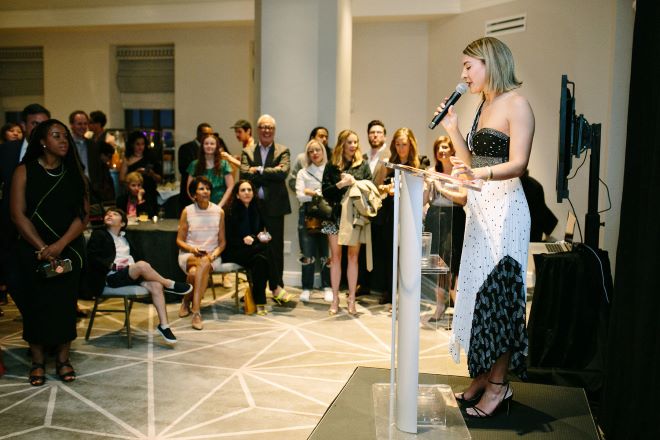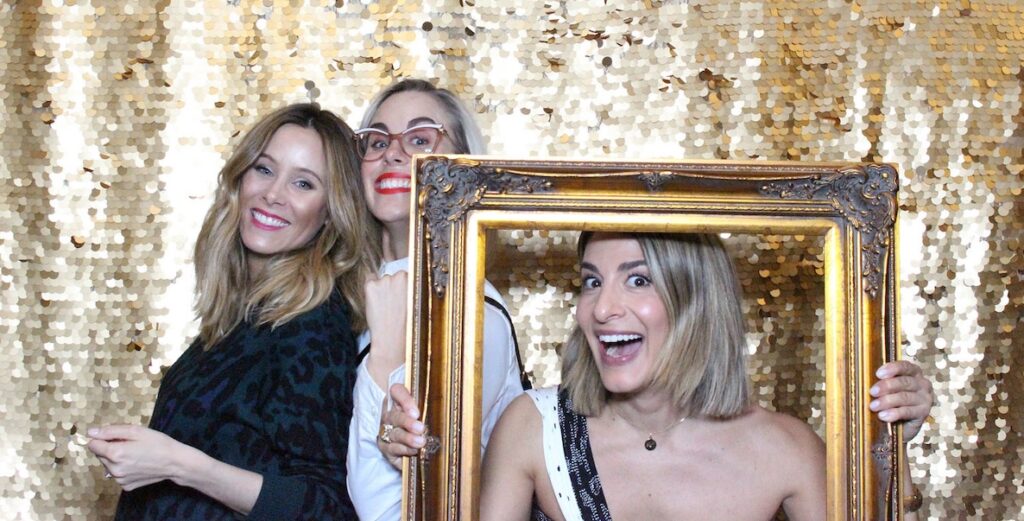You may remember Leah Kauffman from the late aughts, when she was a Temple University student who became a local superstar for her hilarious series of songs that perfectly captured the cultural moment — and that went viral at a time when things didn’t really go viral. There was “Box in a Box,” Kauffman’s retort to the Saturday Night Live hit “Dick in a Box” by Justin Timberlake and Andy Samberg. And then there was “Crush on Obama,” which Newsweek named a “top 10 meme of the decade.”
“At the time, Obama was running for president for his first term, and there were those photos of him running on the beach without a shirt … And, you know, the rest is history,” Kauffman recalls.
Yet, despite her very distinctive and public persona, Kauffman still found herself, as a mid-level editor at philly.com post-graduation, struggling to find her voice at work. At the time, she says, there were few women in leadership positions at Philadelphia Media Network, and her mostly male directors offered advice that was … unhelpful at best. “They would tell me to bring baked goods to meetings and then people would listen to me,” she says. “It felt like I was playing a role.”
So Kauffman decided she needed to look outside of the office for career advice. Specifically, she needed to talk to women. That need — one she realized was shared by many of her peers — led Kauffman to launch Rad Girls, a blog on which she transcribed her conversations with powerful, ambitious and accomplished women in Philadelphia.

And then, in 2015, it led her to start the Rad Awards, an annual celebration of kickass Philly women that she hosted until Covid hit in 2020. In that time, more than 50 women — along with a handful of male allies — were honored for their work as business leaders, lawyers, activists, storytellers, connectors and more. Another 200 were nominated. And hundreds turned out every year to applaud them at a fancy dress gala, with Kauffman enthusiastically and joyfully leading the way.
Now, in partnership with The Citizen, Kauffman is re-launching her Rad Awards. (The reaction to this so far among those who know: “WOO HOO FOR YOU AND EVERYONE INVOLVED!”) You can nominate women in 17 categories here, and then join us for a party at the Kimpton Hotel Palomar on July 17. Deadline for nominations is June 19.
I caught up with Kauffman last week to talk all things Rad Girls. This interview has been condensed and edited for clarity.
Tell me about what prompted you to start Rad Girls.
At the time at [philly.com, now theinquirer.com], it was really hard for me to navigate my career. I wanted more influence, I wanted to be taken seriously. There were not many women who were in positions of power for me to sort of look to. Back then, I would dress differently; I would wear pantsuits, because I wanted to imitate a man. And I would get advice like, you should wear skirts. Or, this is one of my favorite ones: I was told that when women talk over each other, it’s okay, because they’re excited. But when you talk over a guy, they don’t like it. So don’t talk when a guy is talking.
And I decided that I would reach out to women in the Philadelphia area that I admired, to ask them to get coffee, and talk about their career paths, what had worked for them, and if they had any insights they could share with me.
What were some of the lessons you learned?
Resiliency is a huge theme, very common amongst the women that I’ve spoken with — to not give up, to not be demoralized, to keep reaching for the dream, even when other people think that it’s not possible. For example, one of the first women I interviewed was Erin O’Shea, who at the time was one of the only female barbecue pitmasters in the country. She moved here and started her own restaurant — she was the chef at Percy Street Barbecue — and she had faced so much discrimination as a woman who was a pitmaster because to some people that is an unbelievable occupation for a woman. I also interviewed Captain Kim Brady, a woman fighter pilot.
Those were unusual occupations for women, especially at the time — but in any career, it’s harder in many organizations to be a woman, and a mother. I do think some of that has changed now.
How do you think things have changed?
Since I started the blog, Me Too happened. There’s more awareness around DEI [diversity, equity and inclusion]. That really did not exist when I started Rad Girls. There’s generally more awareness about the struggles that women face at work. Covid illuminated a lot of that, with women who left the workforce and haven’t gone back yet.
And storytelling has changed. There’s more storytelling on social media — TikTok wasn’t a thing when I started Rad Girls; Twitter wasn’t as big. People are finding news and information in different ways. I mean, even if you look at LinkedIn, there’s so much sharing of struggle, and we’re all much more aware of these narratives. A big part of it is normalizing some of the struggles that women have gone through.
In those early days, I truly felt alone. I thought that I was the only one who was feeling stuck in my career. And there was something really cathartic about knowing that other women were experiencing the same thing.
Businesswoman Sue Jacobson, who runs a massively successful communications firm and served as chair of the Chamber of Commerce board, recently received the Chamber’s Paradigm Award. She started her speech by talking about how she was scared to go to her first meeting, and had all these insecurities. That was kind of amazing to me.
Yeah, it is amazing. Something I notice now is the way we pathologize that feeling by calling it “imposter syndrome.” I try to tell people that it’s okay to be unsure; there’s nothing wrong with you. You don’t have a “syndrome.” You may just be doing something for the first time and confidence comes with experience.
You held Rad Awards from 2015 until Covid. What were some of the early takeaways?
That there’s such a thirst for this gathering, and also a thirst to be recognized and to be seen. We were watching these individuals and organizations receive awards sometimes for the very first time. There’s something so beautiful about watching that moment for them, knowing that they had put so much effort into making an impact and that they were being applauded.
I initially underestimated how meaningful it is to receive an award. Especially in the beginning, when nobody knew what this was, it was just some random person giving them a random award. And yet it was really meaningful, partly because they weren’t recognized before or they didn’t know anyone was looking. So many of us, we do our jobs, we do the things that we think are meaningful and important. And when you realize that somebody sees your contribution, and everything that you’ve given, it can be so powerful.
What I remember most about the parties is how much joy is in the room. I feel like that’s something that you cultivated. How do you do that?
Honestly, it’s just something that is innate for me. A part of it could be because I’m the eldest child; I have a little sister. I’ve also just been so lucky in my friendships to have really supportive, caring friendships with women. That’s just something I think I’m receptive to. And I think most women want to have that sense of camaraderie with other women.
You’re obviously different than you were when you first started Rad Girls. How have you absorbed those early lessons from women you spoke with?
I left philly.com in 2018, and now work full-time as chief of staff for an adtech company. And I’m a much different leader than I was when I started Rad Girls. I was 25, 26 at the time; I certainly didn’t have a lot of experience, I was just imitating what I observed. As a 38-year-old woman, I find myself really leading more from within a place of empathy and understanding. And, yeah, those are lessons that I’ve learned through speaking with many different women, as a part of Rad Girls, but just also through my experience.
Also in the last four years, I started an executive coaching firm, Levia Coaching. My timing couldn’t have been better: So many people have been questioning their purpose and their values since Covid. I work mostly with women, helping them through any challenges that they’ve encountered at work — it could be something like starting a new job, finding a new job, asking for a promotion or a raise, learning how to become a better manager, learning how to communicate up.
So, you started out by asking all these questions of all these different women, then you started passing on some of that knowledge. And now you’re bringing back Rad Girls. Why do you think people are so excited for its return?
I think there’s an appetite for togetherness — and there will always be an appetite for the joy and recognition and celebrating the achievements of these women.
You can nominate women in 17 categories here (by June 19), and then join us for a party at the Kimpton Hotel Palomar on July 17 from 7 to 10pm.

